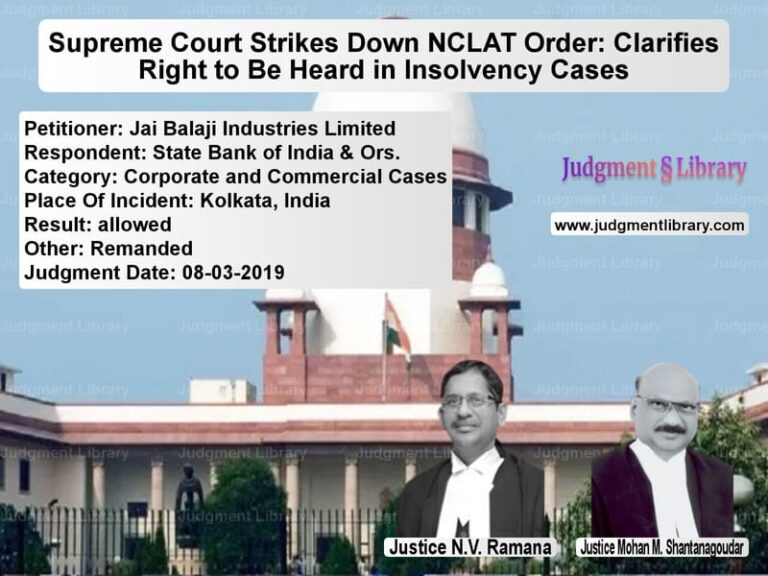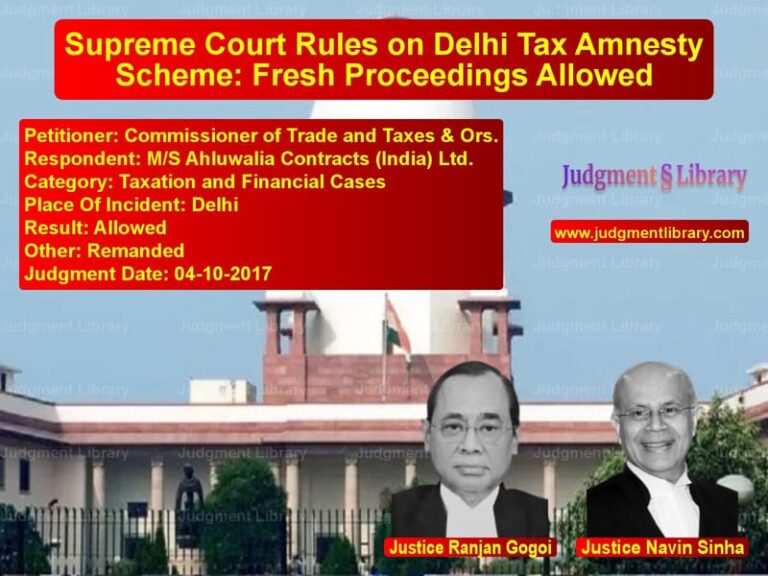Delhi Land Acquisition Dispute: Supreme Court Dismisses Appeal in Vikas Gupta Case
The Supreme Court of India recently ruled on an important land acquisition case in Govt. of NCT of Delhi vs. Vikas Gupta & Ors.. This case involved the question of whether the Government of NCT of Delhi, through its Land and Building Department, had the legal right to continue with a land acquisition process that had already been deemed to have lapsed under the Right to Fair Compensation and Transparency in Land Acquisition, Rehabilitation, and Resettlement Act, 2013. The ruling has significant implications for property owners and land acquisition authorities in Delhi.
Background of the Case
The appellants, the Government of NCT of Delhi, had acquired land for public use. However, the respondents, led by Vikas Gupta and others, challenged the acquisition on the grounds that the process was incomplete and had lapsed under Section 24(2) of the 2013 Act.
Previously, the Supreme Court had already ruled on similar cases involving the Delhi Development Authority (DDA), which had filed appeals in Civil Appeal No. 8477 of 2016 and Civil Appeal No. 5811 of 2015. These appeals had been dismissed, and the Supreme Court found that the same principles applied to the present case.
Key Legal Issues
- Whether the land acquisition proceedings had lapsed under Section 24(2) of the 2013 Act.
- Whether the Government of NCT of Delhi had any legal recourse to retain possession of the land.
- What rights the original landowners had under the new land acquisition law.
Arguments by the Appellant (Government of NCT of Delhi)
The appellants presented the following arguments:
- The land acquisition was conducted legally and should be upheld.
- The government had invested resources into the acquisition and should not be forced to return the land.
- Even if there were technical lapses, the acquisition should be considered valid due to the larger public interest.
Arguments by the Respondents (Vikas Gupta & Ors.)
The respondents, led by Vikas Gupta, countered with the following arguments:
- The acquisition process had lapsed because the government had failed to complete the process within the legally stipulated timeframe.
- Under Section 24(2) of the 2013 Act, incomplete acquisitions cannot be revived.
- The original landowners had a vested right to reclaim possession of their property.
Supreme Court’s Judgment
A two-judge bench comprising Justice Kurian Joseph and Justice Rohinton Fali Nariman dismissed the appeal, ruling that the issue had already been settled in favor of the landowners in previous cases.
The Court stated:
“The issue, in principle, is covered against the appellant by judgments in Civil Appeal No. 8477 of 2016 arising out of Special Leave Petition (C) No. 8467 of 2015 and Civil Appeal No. 5811 of 2015 arising out of Special Leave Petition (C) No. 21545 of 2015. The appeals filed by the requisitioning authority, namely, the Delhi Development Authority, have already been dismissed by this Court.”
However, the Court granted the government one year to initiate fresh acquisition proceedings if necessary.
The ruling included the following directives:
- The Government of NCT of Delhi was given one year to initiate fresh acquisition proceedings under Section 24(2) of the 2013 Act.
- If fresh acquisition proceedings were not initiated within this period, the government would be required to return physical possession of the land to the original landowners.
- Pending applications related to the case were disposed of.
Key Takeaways from the Judgment
- Finality in Land Acquisition Cases: The Supreme Court reaffirmed that incomplete acquisitions cannot be used to indefinitely hold land.
- Protection of Landowners’ Rights: The ruling ensures that landowners are not subjected to unnecessary litigation after a case has been settled.
- Limited Time for Government Action: The one-year timeframe ensures that the government must act promptly if it wishes to proceed with fresh acquisition.
Impact of the Judgment
- Clarification on Land Acquisition Law: The ruling sets a clear precedent on how Section 24(2) of the 2013 Act should be interpreted.
- Ensuring Government Accountability: The judgment prevents land acquisition authorities from keeping landowners in a legal limbo.
- Judicial Efficiency: The Court’s approach discourages repetitive litigation on matters that have already been decided.
Conclusion
The Supreme Court’s ruling in Govt. of NCT of Delhi vs. Vikas Gupta & Ors. is a landmark decision reinforcing the importance of adhering to legal deadlines in land acquisition cases. By dismissing the government’s appeal, the Court upheld the rights of landowners and ensured that authorities remain accountable.
The judgment serves as a critical precedent in land acquisition law, preventing indefinite government control over land and protecting the rights of original landowners.
Don’t miss out on the full details! Download the complete judgment in PDF format below and gain valuable insights instantly!
Download Judgment: Government of NCT of vs Vikas Gupta & Ors. Supreme Court of India Judgment Dated 23-11-2016.pdf
Direct Downlaod Judgment: Direct downlaod this Judgment
See all petitions in Property Disputes
See all petitions in Landlord-Tenant Disputes
See all petitions in Damages and Compensation
See all petitions in Judgment by Kurian Joseph
See all petitions in Judgment by Rohinton Fali Nariman
See all petitions in dismissed
See all petitions in Declared Infructuous
See all petitions in supreme court of India judgments November 2016
See all petitions in 2016 judgments
See all posts in Civil Cases Category
See all allowed petitions in Civil Cases Category
See all Dismissed petitions in Civil Cases Category
See all partially allowed petitions in Civil Cases Category







